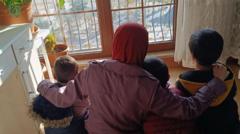"The ongoing plight of Uyghur families separated by asylum politics remains critical as Thai authorities consider deporting detainees back to China, exposing them to severe persecution. Reports reveal harrowing experiences of those held in appalling conditions while outside families cope with uncertainty and fear."
"Uncertain Fate: Uyghur Refugee Families Face Deportation from Thailand"

"Uncertain Fate: Uyghur Refugee Families Face Deportation from Thailand"
"A refugee mother's plea highlights the precarious situation of Uyghurs detained in Thailand amid fears of imminent deportation back to China."
Niluper, an Uyghur mother of three, lives in Turkey burdened by the agony of separation from her husband, who has been detained in Thailand since their family fled Chinese repression nearly a decade ago. Amid mounting concerns over the fate of the remaining Uyghur detainees in Thailand, recent actions by Thai officials suggest a troubling potential for deportation back to China, where they may face severe human rights violations.
Niluper, who escaped with her children in 2015, recounted a recent attempt by the Thai authorities to coerce detainees into signing consent forms for repatriation. Human rights advocates express alarm over the situation, fearing that deportations could occur at any moment despite the Thai government's reassurances. The emotional toll is palpable; Niluper's sons ask frequently about their father, who the youngest has never met.
The plight of Uyghurs in Thailand echoes a dark chapter in 2015 when the country forcibly repatriated 109 Uyghurs, drawing international condemnation. Detainees now face overcrowded and unsanitary conditions in an Immigration Detention Centre (IDC) in Bangkok, where a human rights defender described life as "hell on earth." The IDC houses about 900 inmates, complicating the lives of the 48 remaining Uyghur men who are kept in isolation and subject to the whims of the Thai government.
The detainment conditions faced by these refugees are dire: inadequate food, unclean water, and insufficient medical care are prevalent issues. Additionally, the uncertainty of their fate exacerbates an already unbearable psychological strain, as many fear deportation would lead to severe repercussions in China. Niluper, reflecting on her family's ordeal, shared their fear of being sent back to China, indicating that death would be a preferable outcome compared to the potential horrors that awaited them upon return.
Pressure from Beijing significantly influences Thailand's stance on Uyghur detainees, with the National Security Council overseeing the situation rather than the immigration authorities. Observers note that as ties strengthen between Bangkok and Beijing, the prospects for Uyghur families seeking freedom diminish. The United Nations Refugee Agency has limited capacity to intervene, lacking access to detainees for meaningful assistance.
Even those who escaped, like Hasan Imam, who managed to reach Turkey, reflect the turmoil of alienated families. He, too, fears for the remaining detainees and their families, sharing the harrowing legacy of being cut off from roots and the emotional scars of separation. The uncertainty looms large as both detainees and their families grapple with the thought of potential deportation and the cultural erasure they might face at the hands of an oppressive regime.
As the situation unfolds, the spotlight remains on Thailand's delicate balancing act of foreign relations and human rights obligations, with the hearts of many Uyghur families hanging in the balance.






















